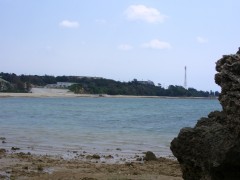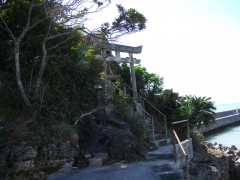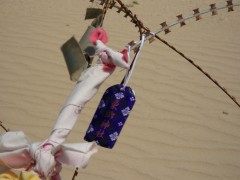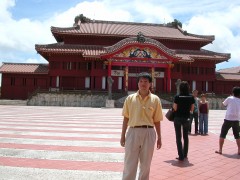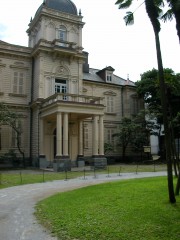04 May 2010
Film"Avatar" is like what's happening in Okinawa
James Cameron's world's biggest box hit film after "Titanic". An ex-US Marine man arrived on a planet and joined the native people by getting his brain signals into artificial figure of that native man. His mission was to blend in their community and negotiate with them in order to dig natural resources from their land.
Well, I did not really enjoy it because the story was cliche and animation scenes were not impressive maybe because I did not see 3D version. I watched it on DVD. After an hour, I just skipped chapters. I would rather like to see a full animated version of the film than mixture of real and animation.
The bottom line is that is the America's apology and remource to native Americans, Iraqi, Afghans, and global environmental destruction. But to me it is really hypocritical after years of deception and wrong doings. Isn't that what they talked about 30 years ago after Vietnam war?
Anyway, if they think they have been doing wrong, why not they rethink current destruction of great nature in Okinawa Prefecture, Japan?
It is taking place in the Henoko Sea right next to US marines' Camp Shwab. It was designated as the relocation site for Futenma base in Ginowan city on the same island. The coral sea is just beautiful. To me, it is better than Guam, Hawaii, Cancoon, and Kota Kinabalu.
Endangered marine mammal, dugongs habitat were recognized.
But construction of runway has been planned on that sea for the US marines by Japanese tax payers' money.
Is it for Japan's defense? No. US military deployed in Japan never functioned as Japan's defense. US marines use Japanese facilities for their training and missions. Well, this issue is very complicated. As you learn more about this issue, you can find Japan side has more to blame. In summary Japanese government can let most of US military leave Japan once they decide to do because there is no merit for Japan by the US military presence and the US military has no more strategic interest in Japan since the Cold War era ended.
However, if the US declares to withdraw troops from Japan without any relocation within Japan, this problem can be easily solved.
On May 4 2010, Japan's prime minister Hatoyama Yukio visited Okinawa governor and mayor of Nago city where Camp Shwab is located. Last month he said "destroying the sea by reclaiming is blaspheming the nature" but later he announced the plan to construct runway by QIP (placing sticks on the sea ground to support runway) format. He is crazy. It is just as destructive to the environment as reclaiming.
The Henoko has shrine on the coast. That god made him say that, I believe.
Or the charm I left in the wire on the beach. The wire divides the beach from restricted area. The charm is what I bought at the Admiral Togo Shrine in Tokyo.
However this construction plan will never be done because Okinawans and even the U.S. military oppose this newly fixed plan. Last September Japan experienced the change of governing party, then the relocation plan got on the review. After months of turmoil left distrust to the Japanese government and the U.S..
But I think this is great progress for Japanese to raise awareness that the U.S. military is nothing but trash and Japan has to defend its country all by themselves. Defending such beautiful sea like the below video from invaders.
But interesting history exists in Okinawa. Okinawa used to be an independent kingdom like Hawaii and Guam. But late 19th century Japanese government took over and annexed to the Empire of Japan. After the world war 2, the U.S. military grounded the island and had occupied until 1972. That is why tens of bases are located in Okinawa. The below photo is recreation of palace of what was called the Ryukyu Kingdom. This place is Okinawa's most famous tourist spot, called Shurijo.
16:47 Posted in Ecology, Japan News, Politics, Travel, US-Japan relationship, USA issues | Permalink | Comments (1) | Tags: okinawa, military
27 February 2010
Film"Gone with the Wind" the origin of Hollywood dynamism
Maybe the most famous Hollywood film in history, I think. I bought the DVD of it for 500 yen recently.
The film was 3 hour and half long and all color though it was produced in 1930's. The story of a passionate and selfish daughter of plantation owner who lived through the Civil War period.
The first public showing in Japan was 1950's because of the war. Many say how come we tried to provoke the war against the country which could produce such dynamic film.
Yes, the film was great. I was really impressed when I first saw the film at younger age.
But now I grew up and see the film from different angle. Well, it still impresses me although it is not best film for me any more.
Beautiful, dynamic scenes, georgeous outfit and interior. Actors do very serious and dynamic acts. Easy to understand script to follow the storyline and its background.
It contains basic elements of entertainment film maybe like "Titanic" and current greatest hit "Avater."
The story was well-done. It was made politically correct as Mammy was taken as a very important character in the story taking into account the time the film was made and in fact a Black actress who played that role won the Academy's best supporting actress award.
However, romantisizing or beautifying the tradition of slavery in the South before the Civil War was not something we should get along. Slavery was wrong. The wealth of the South was consequence of exploitation of Africans. It is like the old western movies that portrayed native Americans as savages and cavalries, the police for white invaders as heroes.
Furthermore, the story is unrealistic. Scarlett who was born in wealthy plantation owner's family and spoiled could live through the turmoil of the war and managed to revive the wealth. She was really fictional character.
I think the theme of the story is what is real "good." Real "good" person is realist who knows how to survive and prevail in real world getting along with reality. Scarlett played a kind of role model for that. But no one could live like that. Those who could live like that are never impressed by this film because they think it is very common practice.
Interesting fact is when the film was first released in the U.S. It was near the second world war. The situation of its enemy, Japan was similar to the Southern Confederation. People believed braveness could beat the enemy states.
After the war Japan was democratised by Yankees and the old elite class people lost so much of their asset by high rate tax imposed on them. Their glory days were gone with the wind like the Southern plantation owners portrayed in the film. The below photo is former house of the old elite class people in Tokyo. Now it has become museum park for anbody to visit and have tea and sweets.
Me, having tea and sweets there.
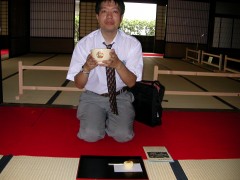
I like the ending of the film because it is not happy ending. In reality happiness doesn't last so long. If you get something good, you should lose something else. But don't get depressed too much, there is a way out and think to find a new way of living.
Yes, you can because tomorrow is another day.
14:45 Posted in Film, US-Japan relationship, USA issues | Permalink | Comments (0) | Tags: racism, history, afro-american
14 February 2010
TOYOTA deserves Recalls and Bashing!
Toyota is Japan's biggest corporation, not only that, it is the world's largest auto company.
But I do not like Toyota, not because recent recall scandals but its arrogance as giant corporation.
The scandal spread from the U.S. to Japan.
A few years ago, Mr. Okuda, a former president and counselor of Toyota made a very arrogant comment in relation to media's bashing of Ministry of Health and Labor. Because Mr. Okuda had a friend in the ministry, he said "Current media's bashing of the ministry is too much, I think we should withdraw sponsorship from them."
What a pity is no media tried not to respond to his comment. Good media should have responded like "Oh, good, then we can reveal anything about Toyota's problem such as heavy overwork on engineers that resulted in death, exploiting dispatched workers for cheaper cost that resulted in masscre in Akihabara shopping district committed by a Toyota factory worker, making public streets warehouse for "Just In Time" policy and etc.
There are too many hidden facts never reported by media because of too strong sponsorhip.
Since his comment, I decided not to buy Toyota cars regardless its quality and brand status. Now such brand status and quality is deteriorated by recent scandals.
For the U.S. auto makers, it is a great opportunity to take over Toyota's share that has been taken. Great time for the revenge?
Well, GM bankrupt itself, not by Toyota.
In my opinion, it is time Toyota and other Japanese auto makers stay away from U.S. market.
The U.S. market is huge but by the world's key currency, US dollar. They do not produce goods by themselves but by Chinese printing US dollar bills to give them.
The world has been supporting the U.S. because it has been thought the largest and most powerful, attractive market in the world.
Kind of weird situation, isn't it.
I think it still is, but you never know the future of it.
The bottom line is safest market is at home. We do not have to seek cheap and high quality goods any more but safe domestic goods.
17:17 Posted in Japan News, Media, Society, US-Japan relationship | Permalink | Comments (0) | Tags: toyota
12 February 2010
Film"The Barbarian and the Geisha" John Wayne in Japan
John Wayne played as U.S. diplomat, Townsend Harris who arrived in Shimoda, Japan 1850's. All the scenes were filmed in Japan 1950's.
Surprised to know John Wayne, a famous cowboy actor was in Japan for filming such historical story.
I do not know if the film was based on accurate historical facts. The movie overall was not bad but the actress who played as Geisha serving Harris did not act well.
It is a story of US diplomacy which forced or persuaded Japan to open up door to the rest of the world. That was the beginning of Japan's modernization after more than 2 centuries of Seclusion period. Ending seclusion was a big controversy at that time and there was pros and cons among the government. Some politician tried to assasinate pro-open Japanese politician and Harris.
This film made me think what was the relationship between two countries. After the first treaty was signed between the two, the both worked together to counter Russia in 1904-1905 but in 1940's the two entered the war. U.S. won, occupied and democratised Japan.
After the second world war, the world went through the Cold War Period, Japan sided with the U.S. That gave Japan favourable position against the U.S. The U.S. had to treat Japan nicely to prevent communism from spreading in Asia. Japan could receive great financial aid from the U.S. and export goods to the U.S. market.
The U.S. won the Cold War. The U.S. became only superpower of the world.
But 911, the war in Afghanistan, Iraq, and Lehman shock changed the things.
The U.S. is no longer dream world nor role model for the democracy.
I, myself recently stopped being very much familiar with the U.S. The U.S. has become one of foreign countries I know.
Especially since military issues such as deployment of CVN 73 in Yokosuka and relocation plan for Futenma base in Okinawa were raised.
I don't like America any more even though I lived there for more than 5 years as college student and know good people over there.
Things changed.
Japanese attitude towards American has really changed recently, the number of Japanese students studying in the U.S. has dropped almost by half from the period I was there and sales of Hollywood films dropped drastically in recent years. Now more than half of the sales comes from Japanese films, but a few years ago it was opposite.
Well, any diplomacy among states is purely based on pragmatism unlike personal relationship.
We have things owing to the U.S. but America is America. Japan is Japan.
After all, most people like to live in their homeland because that is where they get used to living.
18:54 Posted in Film, Politics, US-Japan relationship, USA issues | Permalink | Comments (0) | Tags: history






